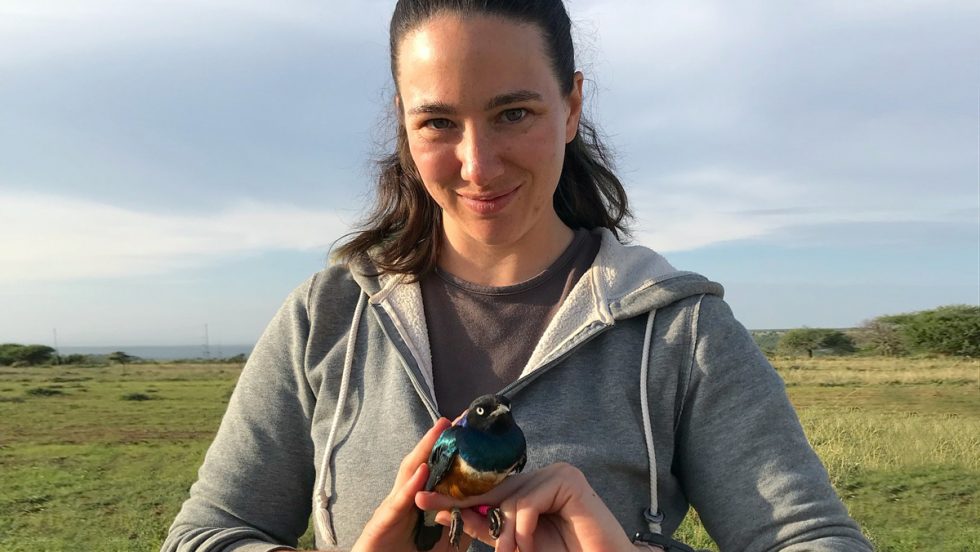
When Shana Caro, PhD, joined the Adelphi faculty in Fall 2022 as an assistant professor of biology, she had a pressing priority. “I wanted to locate a place where I could do fieldwork that was close to campus so that I could easily bring students from campus to help with my research.”
Dr. Caro promptly reached out to John Cronin, JD, president of The Garden City Bird Sanctuary (GCBS) Board of Directors, to propose a partnership with Adelphi that would not only allow her to conduct ongoing research on-site but also enable her to develop educational environmental programs for the sanctuary. For her efforts in establishing this new partnership, Nassau County Legislator Laura Schaefer ’90, JD, presented her with a citation of merit at the sanctuary’s annual Winterfest celebration.
Getting Ready for the Busy Season
For an evolutionary biologist like Dr. Caro, spring is the busiest season to study breeding birds. Her research focuses on the evolution of social behavior—specifically how bird parents and offspring communicate and parents deliver care—in breeding birds, such as European starlings and house sparrows. That’s why she designed her first Garden City Bird Sanctuary education-related project, for local teenagers to paint the birdhouses that will be used in her on-site research into how bird parents care for and communicate with their offspring.
On Saturday, April 8, she partnered with the Franklin Square Public Library in a birdhouse painting event. “The teens painted birdhouses in a variety of colors that might attract different species,” she said. During the event, Dr. Caro also discussed the kind of scientific research that she will be conducting at the sanctuary.
An Interest in Animal Behavior
Growing up in Westchester County, New York, fostered Dr. Caro’s interest in animal behavior—from bugs to birds. “I’d bring insects from under logs into the house and traumatize my parents,” she confessed.
As an undergraduate, Dr. Caro explored how animals balance the need to cooperate and compete with one another, which led to her research trajectory with its current focus on the parental behavior of birds.
Dr. Caro and Adelphi undergraduate researchers in her lab will be monitoring sanctuary bird nests and the newly painted birdhouses—even using small infrared “nanny cams,” as she calls them, that are placed in the birdhouses, can record in the dark and are equipped with microphones—and conducting studies to see just how nestlings communicate with their parents, whether by begging or crying out for food, opening their mouths in a stereotypical “cartoonlike” way, or flapping their wings.
Yet she reported that bird parents—and in about 80 percent of bird species, both parents do equal amounts of care—and offspring often have an evolutionary conflict. How much food should each offspring receive? Do the parents want to feed each chick the same amount of food or do they make choices to determine which offspring might need more food to thrive?
That’s why, with support from an Adelphi start-up fund, Dr. Caro will be looking to see how genuine the offspring’s signaled need for food is and how much attention the parents pay to their signals, as opposed to factors such as chick body size, to determine how much to feed each begging offspring. Can parents tell when a begging chick needs food because it’s truly hungry, or if the chick is more aggressive and simply wants more, meaning it will be fed at the expense of a smaller sibling? (She describes her research in more depth on her website and this video.)
Making an Impact
“While all the basic songbirds of Long Island have been seen at the sanctuary, my research group will focus on two invasive species, house sparrows and European starlings, which have been so successful at colonizing in suburban and urban North America,” she explained.
For Dr. Caro, these non-native species present at the sanctuary can serve as a model for better understanding which species might more readily thrive in an increasingly urban world.
Since she will be conducting her research at a dedicated bird sanctuary, she reported that her research can also shed light on bird conservation and support Long Island bird species. “I’m excited to start getting to know the local bird population, because I’ll be seeing them year after year and seeing what new research questions will emerge from their behavior patterns,” she said.
As she plans more program events, Dr. Caro keeps several goals in mind. “I’m hoping to give the local community access to scientists, so they can ask questions not just about birds, but about science in general, to become more comfortable with the scientific process,” she said. “Running some educational programs will help strengthen the sanctuary. In addition, encouraging volunteering to help maintain the sanctuary will also be beneficial.”